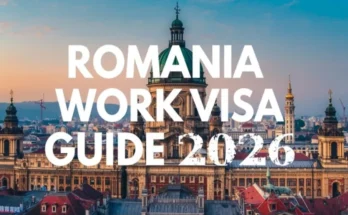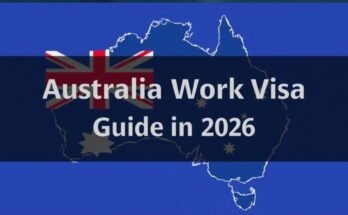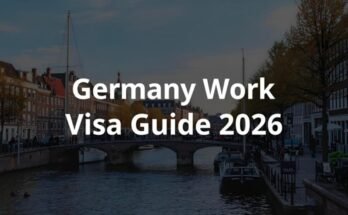Lithuania Work Visa Requirements and How to Apply in 2024
Are you considering a job in Lithuania? It’s crucial to understand the work permit process. The EU work visa system for Lithuania has seen updates for 2024. Whether you’re from the EU or elsewhere, knowing these changes is essential for a seamless immigration experience.
Lithuania’s economy is booming, offering many job opportunities. However, before you start your journey, you must grasp the work visa application process. This guide will cover the basics of obtaining your Lithuanian work permit in 2024.
Key Takeaways
- Lithuania has specific work visa requirements for EU and non-EU citizens
- The Lithuanian work permit process has been updated for 2024
- Understanding visa types and eligibility criteria is crucial
- Proper documentation is essential for a successful application
- Familiarize yourself with processing times and fees before applying
- Employment contract details play a significant role in visa approval
Understanding Lithuania’s Work Visa System
Lithuania offers various work permit options for foreign nationals seeking employment in the country. The Lithuanian work visa system aims to attract skilled professionals while maintaining legal employment standards.
Types of Work Permits Available
Lithuania provides several Lithuanian work permit types to accommodate different employment situations:
- Temporary residence permit for work
- Blue Card EU for highly qualified professionals
- Intra-corporate transfer permit
- Seasonal worker permit
Eligibility Criteria Overview
The eligibility for Lithuanian work visa depends on factors such as job offer, qualifications, and salary level. Applicants must meet specific requirements for each permit type:
| Permit Type | Key Eligibility Criteria |
|---|---|
| Temporary residence permit | Valid job offer, work contract |
| Blue Card EU | Higher education, specialized skills, minimum salary threshold |
| Intra-corporate transfer | Employment with parent company, managerial position |
| Seasonal worker | Short-term contract, specific sectors |
Duration and Validity Periods
Work permits in Lithuania have varying validity periods:
- Temporary residence permit: Up to 3 years, renewable
- Blue Card EU: Initial 3 years, extendable
- Intra-corporate transfer: Maximum 3 years for managers, 1 year for specialists
- Seasonal worker: Up to 9 months within a 12-month period
Understanding these aspects of Lithuania’s work visa system helps applicants choose the most suitable permit for their situation.
Who Needs a Work Visa for Lithuania
Understanding who needs a work visa is crucial for those planning to join the Lithuanian labor market. The requirements vary based on citizenship and specific circumstances.
EU/EEA Citizens vs Non-EU Nationals
EU citizens working in Lithuania enjoy freedom of movement and don’t need a work visa. They can live and work freely in Lithuania, only needing to register their residence if staying longer than 3 months. Non-EU workers, on the other hand, typically require a work visa to enter the Lithuanian labor market.
Exempt Categories and Special Cases
Some non-EU nationals may be exempt from work visa requirements. These include:
- Permanent residents of Lithuania
- Asylum seekers with temporary protection status
- Students pursuing full-time studies in Lithuanian institutions
- Researchers and lecturers on short-term assignments
Qualification Requirements
For those seeking a skilled workers visa, Lithuania has specific qualification requirements:
| Visa Type | Qualifications Needed |
|---|---|
| General Work Visa | Relevant work experience, job offer from Lithuanian employer |
| High-Skilled Worker Visa | University degree, specialized skills, higher salary threshold |
| Startup Visa | Innovative business idea, sufficient funds |
Meeting these requirements is essential for non-EU workers aiming to contribute to Lithuania’s growing economy.
Lithuania Work Visa Requirements and How to Apply in 2024
The process for obtaining a work visa in Lithuania for 2024 is detailed and requires specific steps. Foreigners aiming to work in Lithuania must carefully follow these guidelines to ensure their application is successful.
Requirements for work permits in Lithuania differ by nationality and job type. EU/EEA citizens often don’t need a work permit. However, non-EU nationals must secure one before beginning their employment.
Key documents needed for Lithuanian visa applications include:
- Valid passport
- Completed visa application form
- Passport-sized photographs
- Proof of accommodation in Lithuania
- Employment contract or job offer letter
- Health insurance coverage
The steps to apply for a visa involve:
- Gathering all necessary documents
- Submitting the application to the Lithuanian embassy or consulate
- Paying the visa fee
- Attending an interview (if necessary)
- Waiting for the decision
Application processing times can vary. However, applicants should plan for at least 15 working days for standard applications. For a quicker process, fast-track options are available for an additional fee.
| Visa Type | Processing Time | Validity |
|---|---|---|
| Short-term work visa | 15 working days | Up to 90 days |
| Long-term work visa | 30 working days | Up to 1 year |
| EU Blue Card | 45 working days | Up to 3 years |
Required Documentation for Lithuanian Work Visa
Securing the right Lithuanian visa documents is essential for a successful application. This entails collecting personal papers, proof of qualifications, and financial statements. Let’s delve into the key components you’ll need to prepare.
Personal Documents Checklist
Your application begins with basic personal documents. These include a valid passport, recent passport-sized photos, and a completed visa application form. Additionally, you’ll need to provide proof of accommodation in Lithuania and health insurance for your stay.
Professional Qualifications Evidence
Showing your professional skills is crucial. Your qualifications should include diplomas, certificates, and a detailed CV. If you have a work contract in Lithuania, include it as well. This demonstrates your suitability for the job you’re applying for in Lithuania.
Financial Requirements
Proving your financial capability is necessary. Your financial statements for visa applications should include bank statements, proof of income, or a sponsor’s letter. The required amount varies, so it’s important to check the latest requirements from the Lithuanian Immigration Office.
| Document Type | Purpose | Notes |
|---|---|---|
| Passport | Identification | Valid for at least 3 months beyond stay |
| Work Contract | Employment Proof | Must be from Lithuanian employer |
| Bank Statements | Financial Stability | Last 3-6 months |
| Qualifications | Skill Verification | Diplomas and certificates |
Step-by-Step Application Process
Applying for a Lithuanian work visa requires several steps. The process includes online applications, embassy submissions, and biometric data collection. This guide will help you understand the Lithuanian visa application steps:
- Start with an online visa application on the official Lithuanian immigration portal.
- Complete the application form accurately, including all personal and professional details.
- Upload scanned copies of necessary documents, such as your passport and job offer letter.
- Pay the visa application fee online using the available payment options.
- Schedule an appointment at the Lithuanian embassy or consulate in your country.
- Visit the embassy on your appointment date for document submission and biometric data collection.
- Provide fingerprints and a digital photograph as part of the biometric process.
- Wait for the embassy to process your application and make a decision.
The embassy submission is a critical part of the process. Ensure all your documents are originals or certified copies. The biometric data collection is mandatory for most applicants. It helps verify your identity.
| Application Stage | Estimated Time | Key Requirements |
|---|---|---|
| Online Application | 1-2 hours | Internet access, scanned documents |
| Document Preparation | 1-2 weeks | Original documents, translations |
| Embassy Submission | 1 day | Appointment, all documents |
| Biometric Data Collection | 30 minutes | Physical presence at embassy |
| Visa Processing | 2-4 weeks | Patience, follow-up if needed |
By following these steps and preparing thoroughly, you’ll increase your chances of a smooth Lithuanian work visa application process.
Processing Times and Application Fees
Understanding the Lithuanian visa processing time and associated fees is crucial for planning your work visa application. The process can vary depending on your chosen service and specific circumstances.
Standard Processing Duration
The typical Lithuanian visa processing time ranges from 15 to 30 calendar days. This duration applies to most work visa applications submitted through regular channels. Keep in mind that complex cases may require additional time for review.
Fast-Track Options
For those needing quicker results, an expedited visa service is available. This fast-track option can reduce processing times to 5-10 business days, though it comes with a higher fee. To utilize this service, applicants must clearly indicate their request for expedited processing when submitting their application.
Current Fee Structure
Visa application fees vary based on the type of visa and processing speed. Here’s a breakdown of current costs:
| Visa Type | Standard Fee | Expedited Fee |
|---|---|---|
| Short-term Work Visa | €80 | €160 |
| Long-term Work Visa | €120 | €240 |
| Blue Card | €150 | €300 |
Accepted payment methods include credit cards, bank transfers, and cash at certain embassy locations. Remember to factor these visa application fees into your budget when planning your move to Lithuania for work.
Employment Contract Requirements
Understanding Lithuanian labor laws is crucial when applying for a work visa. Your employment agreement must comply with these regulations to ensure a smooth application process.
Employment contracts in Lithuania should include essential details such as job responsibilities, working hours, and compensation. The minimum wage Lithuania is set at €840 per month as of 2024, and your contract must meet or exceed this amount.
Key elements of a valid employment agreement include:
- Job title and description
- Start date and contract duration
- Salary and payment schedule
- Working hours and overtime policies
- Annual leave entitlement
- Notice period for termination
Lithuanian labor laws mandate specific working conditions to protect employees. These include a maximum 40-hour workweek, paid annual leave of at least 20 working days, and overtime compensation.
| Aspect | Requirement |
|---|---|
| Minimum Wage | €840 per month |
| Maximum Work Hours | 40 hours per week |
| Minimum Annual Leave | 20 working days |
| Overtime Pay | 1.5x regular rate |
Ensure your employment contract aligns with these requirements to avoid issues with your work visa application. It’s advisable to have a legal professional review your agreement before submission.
Lithuanian Immigration Office Guidelines
The Lithuanian Migration Department is key in the work visa application process. Knowing their guidelines can make your experience smoother when looking for a job in Lithuania.
Contact Information
For visa inquiries, contact the Lithuanian Migration Department. Their helpline is open Monday to Friday, 8 AM to 5 PM. Expect an email response within 3 business days.
| Contact Method | Details |
|---|---|
| Phone | +370 5 271 7112 |
| info@migracija.gov.lt | |
| Website | www.migracija.lt |
Office Locations
The Migration Department has offices in major Lithuanian cities. Vilnius is home to the main branch, with regional offices covering other areas. Visa application centers are available in select locations for your convenience.
Booking Appointments
Book appointments online through the Migration Department’s website. Choose your preferred office and time slot. Ensure you have all necessary documents ready for your appointment. The embassy of Lithuania or local consular services can offer pre-application guidance if required.
Arrive on time for your appointment at the Lithuanian Migration Department. This shows your commitment to following the proper procedures for your work visa application.
Common Reasons for Visa Rejection
Receiving a denial for your Lithuanian work visa can be disheartening. Visa application errors are a leading cause of rejections. It’s crucial to double-check all forms for accuracy before submission. Ensure you’ve included all necessary documents, from your passport to job offer letters.
Background check failures can also hinder your visa application. Honesty about your past is essential. Address any potential issues upfront. If your application is rejected, don’t lose hope. The visa appeal process provides a second opportunity. Gather new evidence, address the reasons for rejection, and reapply promptly.
To enhance your chances of success, meticulously follow all instructions from the Lithuanian Immigration Office. Pay close attention to deadlines and format requirements. If you’re unsure about any part of the process, seeking legal advice is wise. With thorough preparation, you can avoid common pitfalls and increase your approval chances.


